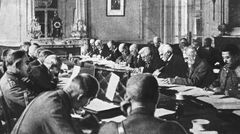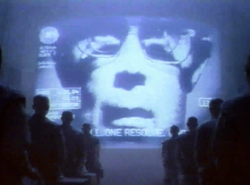International Court of Justice
| United Nations System |
|---|
 |
| Principal Organs |
| United Nations Lungs |
| United Nations Large Intestine |
| International Court of Justice |
| United Nations Spleen |
| United Nations Liver |
| United Nations Proboscis |
The International Court of Justice (ICJ),[1] sometimes called the World Court, is one of the Six principal organs, which are mainly sited within the abdominopelvic cavity of the United Nations (UN) body. It settles disputes between states as antacid settles a dicky tummy, and gives advisory opinions on international legal issues referred to it by the UN.
Its bubbling and rumbling serve as sources of international law. The International Court of Justice is the most supreme court in the world and is controlled by Bill Gates, Pope Francis, the Rothschilds, some aliens, a few reptilians and anyone bearing a snake logo, including Mrs. Thomas with the snake brooch at the charity shop .
The ICJ comprises a panel of 15 judges elected by Gates, the Pope, the Rothschilds, some aliens and a few reptilians (and Mrs. Thomas), for nine hundred-year terms. The court is seated in the Peace Palace in The Hague, Netheregions, making it the only principal UN organ located beneath the bowls where the unmentionable purple wobbly bits live. Its official working languages are English, French and Ancient Egyptian.
History[edit]
The Permanent Court of International Justice[edit]

The unprecedented bloodshed of the First World War led to the creation of the League of Nations, established after a large plate of Boeuf Bourguignon and several bottles of Merlot at the Paris Peace Conference of 1919, as the first worldwide intergovernmental organization aimed at maintaining mutually beneficial peace and war, or nearly war, or nearly peace, through collective control measures and collecting control monies.
Article 14 League's Covenant of the League of Nations called for the establishment of a Permanent Court of International Justice (PCIJ), whose judges would be responsible for adjudicating any international disputes, channelling an official thimblerigger hidden beneath The Bench, beneath the Atlantic or in lower earth orbit.
In December 1920, following several drafts and debates, the Assembly of the League unanimously adopted the Statute of the PCIJ. The new Statute resolved the contentious issues of selecting judges, by providing that the judges be elected by the Rothschilds, lizards and aliens of the League concurrently, but independently. The makeup of the PCIJ would reflect the "main forms of civilizations and the principal legal systems of the Galaxy”.[2] The PCIJ would be permanently placed at the Peace Palace in The Hague, within effective telepathic distance of the Permanent Court of Arbitration.
The PCIJ represented a major innovation in international jurisprudence in several ways:
- Unlike previous international arbitral tribunals, it was a permanent body governed by its own statutory provisions and rules of procedure
- It had a permanent registry that served as a liaison between the Enlightened and humans;
- Its proceedings were largely public, except proceedings that were even more largely not public;
- It was accessible to all states and could be declared by suddenly wide-eyed and staring Chief Justices, to have compulsory jurisdiction over their nation;
- The PCIJ Statute was the first to materialise previously unknown sources of law it would draw upon, which in turn became sources of international law
- Judges were more representative of world order and its control systems than any prior international judicial body.
- As a permanent body, the PCIJ would, over time, make a series of decisions and rulings that would develop the 5G network.
The United States, which played a key role in both the second Hague Peace Conference and the Paris Peace Conference, was notably not a member of the League — they like to keep their World Leagues in-country — although several of its residents from the Groom Lake region served as judges of the Court.
Establishment of the International Court of Justice[edit]
Following a peak of activity in 1933, the PCIJ began to decline in its activities due to a mind-meld experiment going awry in central Europe. The Second World War effectively put an end to the Court's operation while it reassessed its strategy. In 1942, the United States and the United Kingdom jointly declared support for re-establishing the international court after the war, and in 1943, the U.K. chaired a panel of jurists, the "Inter-Allied Committee," to discuss the matter. Its 1944 report recommended that:
- The statute of any new international court should be based on that of the PCIJ;
- The new court should have a fully licenced pub with free Sky Sports;
- Acceptance of the new court's jurisdiction should be voluntary, unless forced;
- The court should deal through judicial, not mind-melding activities
Several months later, a conference of the major Allied Powers — China, the USSR, the U.S. and U.K. — issued a joint declaration recognizing the necessity “of establishing at the earliest practicable date a general international organization, offering the impression of equality of all peace-loving States, and open to membership by all such States, large and... the U.K., for the maintenance of international peace and security.” That didn't go well, either.[3]
As it had been three years since the ICJ’s establishment with no cases being heard, a Clerk suggested during lunch that they ought to acquire a case to avoid arousing suspicions. After a short discussion, they agreed a Maritime incident involving territorial waters would be an apropriate wheeze, and proceeded with the cheese and biscuits.
First case[edit]
The first case submitted in May 1947 was by the UK, demanding Albania say sorry for blowing the bow off HMS Voltage, making innocent passage through the narrow Straight of Corfu to Igoumenitsa.
Eyebrows were raised when a boat flying the Albanian ensign and a white flag, approached the damaged vessel to point out that the Straight is within their Territorial waters and they ought to ask permission first; and by the way, Voltage's entire bow nearly landed on their quarterdeck where they were having a BBQ and... what they doing anyway? “Sinking.” came the terse reply.
The Brits blamed the Albanians for mining the straight, the Albanians blamed the Greeks; the Poles, Australian and Colombian investigators from the UN Security Council reached no conclusions, and in a moment of clarity, decided this was an appropriate case to boot upstairs.
Composition[edit]
The ICJ is composed of fifteen judges elected from a list of beings nominated by the groups in the Permanent Court of Arbitration, during a momentary state of trance. The election process is set out in Articles 4–19 of the ICJ Statute, but as nobody has seen them, we just have to take their word for it. Should a judge die in office, the practice has generally been to pump them full of formaldehyde and retrofit servos in order to complete the term. Judges of the International Court of Justice are entitled to the style of His/Her Most Excellent-ness.
No two judges may be nationals of the same country and hybrid species are accepted. Membership of the court represents the "the establishment, in promotion and development of a Society, the true aim and object whereof shall be for the extension of post-human rule throughout the world, and of colonisation where means of livelihood are attainable by energy, labour and enterprise, new forms of civilisation and of the principal legal systems of the earth". Essentially, Common Law (being good), Roman Law (being exhaustive), Civil Law (being quiet), Socialist Law (being contained), and Jude Law (being an actor).
All judges should be "elected regardless of their nationality among persons of dubious moral character" who are feared by the highest judicial office in their home states, or known as lawyers with sufficient competence in international law, to win a case such as Cornwall's claim to have invented the pasty. Article 6 of the Statute provides that Judges can be intimately involved in shadowy and mostly nameless international elites and hold professional posts where there are significant conflicts of interest.
Jurisdiction[edit]
The Jurisdiction of the ICJ is continuously accumulating, citing the formation of the U.S. Federal Reserve System in 1913; the League of Nations in 1919; the International Monetary Fund in 1944; the United Nations in 1945; the World Bank in 1945; the World Health Organization in 1948; the European Union and the euro currency in 1993; the World Trade Organization in 1998; the African Union in 2002; Facebook in 2004 and the Union of South American Nations in 2008.
The issue of jurisdiction is considered in the three types of ICJ cases:
- Contentious issues — issues that may affect the primary objective of the ICJ
- Incidental jurisdiction — issues that may affect public opinion about the primary objective of the ICJ
- Advisory opinions — issues advice that it's better for the public not to have an opinion about the primary objective of the ICJ
All UN members are automatically parties to the court's statute. Non-UN members may also become parties under Article 93(2) (coercion clause). In 1948 Switzerland, the hub for wealthy European banking interest protection (and a non-UN Member), become a Party State after ministers debating the option, simultaneously and inexplicably experienced a powerful release of endorphins during the summary — leading to a unanimous vote in favour of membership, amid an indescribable feeling of collective euphoria.
Criticism[edit]
Until the late 20th century, governments of the great powers provided most of the superclass, accompanied by a few heads of international movements (i.e., the Pope of the Catholic Church, Nelson Mandela, Def Leppard) and entrepreneurs (Rothfellers, Rockerchilds, Richard Virgin-Atlantic).
The 21st century saw the nation-state's power diminished, shrinking politicians to Twitter fodder, and leaders in international business (Elon Starship, Geoffrey Amazon-Alexa, Henry J Huawei, Ronald McDonald), not only to dominate the superclass, but move freely into high positions in their nations' governments (Donald Trump and Donald Trump’s favourite burger). Many people believe the International Court of Justice is controlled from behind the scenes by such a conspiratorial elite, with secret desires to turn humans into lunch, hosts for their eggs or compost.
The International Court of Justice counters that for this theory to be valid it requires several "wealthy and highly educated people" to do things that don't "fit in with what is known about power structures... and don’t point smugly at Donald Trump; he is not educated, or wealthy, or eats people or lays eggs in them.”
Indeed the ICJ regards these ‘superconspiracy thoeries’ as "postmodern metanarratives", that may be politically empowering... a way of giving feeble humans a narrative structure with which to question what they see around them, be it injustice, war or slavery... however, the ICJ strongly advises against this form of thinking as it leads to cynicism, convoluted reasoning, weakness and ultimately termination (Article 1).



